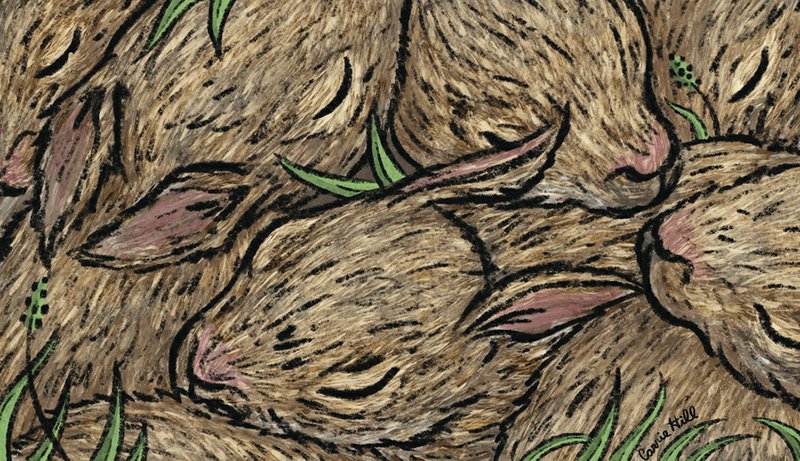Q While I was picking up sticks in the yard prior to mowing, I found two baby rabbits sitting in a shallow nest in the grass. The mother was nowhere to be seen. If I take these bunnies inside, how do I care for them? Would they make good family pets?
A No, they are wild animals and cannot be domesticated. So please don't move them.
Wild rabbits stay away from their nests most of the day to avoid attracting predators. They return for only a few minutes at dawn and dusk when no one is around.
Mother rabbits use grass and fur to make nests so warm they don't need to sit on them all day as other species do. Most rabbits build their nests out in the open, sometimes in the middle of the lawn.
Rabbit milk is so rich that mothers need to nurse their young only five minutes a day. The babies grow quickly, leaving the nest within a few weeks.
Before you mow, temporarily cover the nest in your yard with a laundry basket so the babies don't bolt and get hurt by the lawnmower.
If a pet disturbs the nest, rebuild it, and return the bunnies to it. Then keep your pets away.
You and your children can peek at the baby rabbits, but don't touch them. If anyone picks up a bunny, return it to the nest. A little human scent will not prevent the mother from caring for her young.
If it's clear the mother rabbit was killed, contact a wildlife rehabilitator who can best raise the orphaned bunnies. Your veterinarian or local animal shelter can give you names. In most areas, it's illegal for people without a wildlife rehabilitator's license to keep wildlife.
[While it would be legal in Arkansas to keep baby cottontail rabbits without such a license, under state regulations, the rabbits would have to be kept in cages and could never be sold or given to anyone else -- except to a licensed wildlife rehabilitator for release to the wild. Males and females would have to be separated until they were neutered to prevent reproduction. Kirsten Bartlow, Watchable Wildlife coordinator for the Arkansas Game and Fish Commission, says she would not take baby rabbits from the wild as pets. Here is a shortcut link to the commission's regulations on wildlife pets: arkansasonline.com/427pets.
Bartlow says, "In prolific species such as songbirds and rabbits, up to 80% of the young die their first year, so attrition is part of nature's way. By rescuing one wild animal, you may be depriving another of its prey. It may sound cruel, but an injured or orphaned animal becomes a meal for another wildlife parent and its young — this is how nature works."]
Q Our family is debating whether it's OK to feed table scraps to our dogs. I say it's fine because that's all dogs ate before commercial dog food was invented.
A Sorry, but the veterinary community disagrees with you. Decades of research by veterinary nutritionists have led to the well-balanced, nutritionally complete commercial foods our pets now eat. Because of improved diets and veterinary care, today's pets enjoy longer, healthier lives.
If table scraps constitute 10% or more of a dog's food intake, they unbalance the diet and cause medical problems.
Chief among them is excess body weight. It's a fact: Most dogs given table food are overweight. Even when dogs eat reasonable portions of dog food, the additional calories from people food, which most pet lovers forget to count, add up to weight gain.
In addition, table scraps often cause stomach and intestinal upset, particularly if they vary from day to day or are high in fat. It's never fun to clean up — or accidentally step in — the results of a dog's stomach upset, so why increase the risk by feeding table food?
The worst form of gastrointestinal upset is pancreatitis, or inflammation of the organ that makes vital digestive enzymes. The victim's pancreas begins to digest itself, which results in severe pain and sometimes diabetes or death.
Moreover, some table scraps are toxic to our canine family members. In dogs:
◼️ Onions and garlic damage red blood cells, preventing them from carrying oxygen throughout the body.
◼️ Grapes and raisins can harm the kidneys.
◼️ Xylitol, a sugar substitute found in many foods, including some peanut butters, causes liver damage, hypoglycemia and seizures.
Once you start feeding table scraps, it can be hard to say no to your dogs' pleading eyes. So don't start, and if you already have, stop.
Lee Pickett, VMD, practices companion animal medicine in North Carolina. Contact her at
askthevet.pet
Style on 04/27/2020

